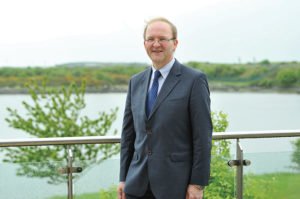‘Marathon, not a sprint’ for HSE board, says Chairperson
The Chair of the HSE board is disappointed with the recent resignation of patient advocate Mr Mark Molloy but told this newspaper that the board remains focused on quality and safety issues. Mr Molloy resigned from the HSE board over the lack of funding for the national maternity strategy.
“The board is bigger than all of us, including me,” Mr Ciarán Devane told the Medical Independent (MI) at the National Health Summit, held in Croke Park, Dublin, on 6 February.
“I think Mark is a great guy; [he has] made a fantastic contribution over the years.
“The safety and quality sub- committee is working. We are eight months old. It [the sub-committee] has met six times and the average length of the meeting is about six hours,” Mr Devane told MI.
“By the way, we are talking about safety at the main board as well. I would not claim that we are perfectly into our stride yet, because we are only eight months old. But we are very clear that our focus is on safety and quality, delivery. To use a terrible cliché, it’s a marathon, not a sprint.”
On the issue of the electronic health record and e-heath, Mr Devane said that progress is important but will take time.
“There is a capital plan, and there is a separate ICT capital plan. What we need to make sure is that the ICT capital plan reflects the technology that will enable [improved] care pathways,” said Mr Devane.
“And it’s about health records, interoperability, and it’s about devices. What is the thing that will make the life of the nurse on the ward easier and release some time back to them?
“So the ICT capital plan will need to look at all of that.
“Again, that is not small. I’m sure you will know that the healthcare world is full of the big IT projects that did not quite work. I think we have escaped most of that in Ireland.”
Also speaking at the summit, HSE CEO Mr Paul Reid said the creation of the new board last year was an important move.
“Time worked out well for myself [taking over as CEO]. A new board had just been appointed,” he told the summit.
“So that has created a fairly fundamental difference to the governance structure at the HSE. In fact I often reflect, isn’t it crazy that a €17 billion organisation didn’t have a board?”
GPs seek more integrated system
The ICGP has established “strong links” with the Sláintecare Programme Office and its Director Ms Laura Magahy, the National Health Summit was told earlier this month.

Speaking to attendees, Dr Tony Cox, Medical Director of the ICGP and GP based in Ennis, Co Clare, spoke of his own support for the Sláintecare plan.
“The key word here is ‘integration’ and for GPs, things need to be joined-up [with the hospital system],” said Dr Cox.

“Patients go to the hospital, they come back and we don’t get that referral letter back, or the feedback from the hospital as to what happened… the patient tries their best to relay their experience to you, and all that time you are waiting for that letter from the hospital to give you that little more detail.”
Dr Cox added that there needed to be “a better appreciation of the role GPs play, then provide us with the resources, integrate us into the service… thankfully, a lot of that is happening.”
The ICGP Medical Director added that he recently attended a meeting in Sligo outlining the new chronic disease management system to be provided by GPs who opt into the service.
“There is a plan to resource chronic disease management in general practice, and that is very timely and very good and worthy,” he said.
“We have had five meetings so far; large numbers of GPs turned up. GPs want this to happen, GPs want to look after our patients, they want the resources there.”
Dr Cox said that the numbers of GPs in trainee schemes would have to increase to help resource the Sláintecare vision.
“We are looking to get 217 GPs into training posts this year. We have had a large number of applications, 461 young doctors applied to join the GP training scheme, so there is great interest in becoming a GP,” he said.
“Finding the training post is the challenge and funding the training post is the challenge…we need to get to up to 240 a year very rapidly — actually, we need to get to 300, and that is really just standing still.”
Sláintecare brand will grow as patients experience change — Magahy
The Sláintecare Programme Office is adequately staffed to lead the implementation of the 10-year plan for the transformation of the health service, the office Director has told this newspaper.
A Department of Health spokesperson told the Medical Independent (MI) that there are “currently 18 members of staff in the Department of Health working in the Sláintecare office”.
Asked whether she had enough staff to carry out the major work in front of her, Ms Laura Magahy, Director of the Sláintecare Programme Office, told MI that “yes, we do”.
“We are doing it in conjunction with the HSE, and doing it with colleagues in the Department of Health. There is plenty of resourcing,” said Ms Magahy, who was speaking to this newspaper at the recent National Health Summit in Dublin.
Asked whether she was concerned with what some say is the low level of public understanding and awareness of Sláintecare, Ms Magahy said she was confident this would increase over time.
“I think people will know it as they experience the change,” she said.
“We do have regional engagement with citizens on a wider basis planned for this year. I think it will grow. But there was no point in promising until we could deliver. To have the all-party buy-in still is fantastic and it gives us another five years to keep planning forward [under a new Government].”
Addressing summit attendees on the planned regional reorganisation of the health service, Ms Magahy said: “I really want to emphasise that it really is just an enabler.
“Simply just to do structures is not going to make any difference whatsoever to the services people need…it’s about the service, it’s not about structures.”
She added that significant changes to the health service will take some years.
“There is no point saying it will be done tomorrow. If it was easy, it would have been done already”, she said.
“It takes deliberate, careful planning. We are 15 months into the office this week. We are at the beginning; it is gathering momentum. It’s about keeping politicians with it, getting wider recognition as to what the plan is.
“Getting resourcing in behind it on a multi-annual basis. There is no point in us saying we can deliver Sláintecare if we don’t have multi-annual [funding].”
Ireland ‘as prepared as it can be’ for coronavirus
The HSE and other health bodies are as “prepared as can be” for any possible cases of coronavirus in Ireland, the Chair of the HSE board told the National Health Summit on 6 February.
“There are, fortunately, no confirmed cases of coronavirus in the country at the moment,” Mr Ciarán Devane, Chair of the HSE board told attendees at the summit in Croke Park, Dublin.
“It’s a huge challenge. I think the partnership between the HSE and the Department [of Health] and other agencies has been working very well. The advisory committee that Dr Cillian [De Gascun] is heading is up-and-running, the testing is taking place in Ireland, so samples are not having to go to the UK, so we can turn the samples around quickly. We are as prepared as can be.
“The preparation that is going in now is really important, and our thanks goes to everyone who is doing everything possible to make that happen.”
Mr Devane also paid respect to the doctors and other healthcare workers in China who are dealing with the outbreak on the front lines. “I know from my ‘day job’ [Chief Executive of the British Council] the efforts the Chinese authorities are doing to make sure the virus is contained as much as possible within China and doesn’t break out of China,” he said.
“Our thanks and recognition has to go to the heroic efforts of healthcare workers in China who are doing this job.”
Mr Devane also recognised the Chinese diaspora in Ireland who are “worrying about family and friends back in China; we have to acknowledge them”.
According to the Department of Health, there have been 65 suspected cases of coronavirus tested in the National Virus Reference Laboratory as of Tuesday 11 February.
At the time of going to press, there were no confirmed cases of coronavirus in Ireland.
In a statement, the Chief Medical Officer of the Department of Health, Dr Tony Holohan, said: “The event of a confirmed case of coronavirus in Ireland is possible, given the increase in cases we are seeing internationally. Ireland has comprehensive public health and emergency plans in place and is prepared for the event of a confirmed case, should one arise.”
#healthsummit20
Here is just a small sample of the tweets posted during #healthsummit20
“Fantastic example of Sláintecare
in action, providing universal access to public psychological counselling
services in Roscommon, #healthsummit20
by Dr Ronan Collins.”
Dr Sara Burke, @sburx
“Paul Reid focusing on cost-saving
capacity of biosimilars in order to fund new drugs. Flagging the importance of
the upcoming pricing framework negotiations this summer, #healthsummit20.”
Marian Hernon, @Marian_Hernon
“‘We have the opportunity now to get behind Sláintecare, to make tough decisions and to get it (healthcare) right.’ Ciarán Devane, Chairman of @HSELive at the opening of #healthsummit20.”Paul Connors, @paulconnors27
“A really interesting panel
discussion on forming the new regional health areas. The aim is to increase
transparency, reduce bureaucracy, and ensure better joined-up care at local
level, #healthsummit20 #sláintecare.”
Janssen Ireland, @JanssenIE
“Great innovation happening to help
avoid hospital admissions and treat patients at home, #healthsummit20.”
RDurcan, @DurcanRosemary
“In a 1:1 discussion today with @AudreyCarville at the #healthsummit20 in @CrokePark. Setting
out some positive outcomes for healthcare in Ireland, our reform plans and some
challenges, @HSELive.”
Paul Reid, @paulreiddublin













Leave a Reply
You must be logged in to post a comment.